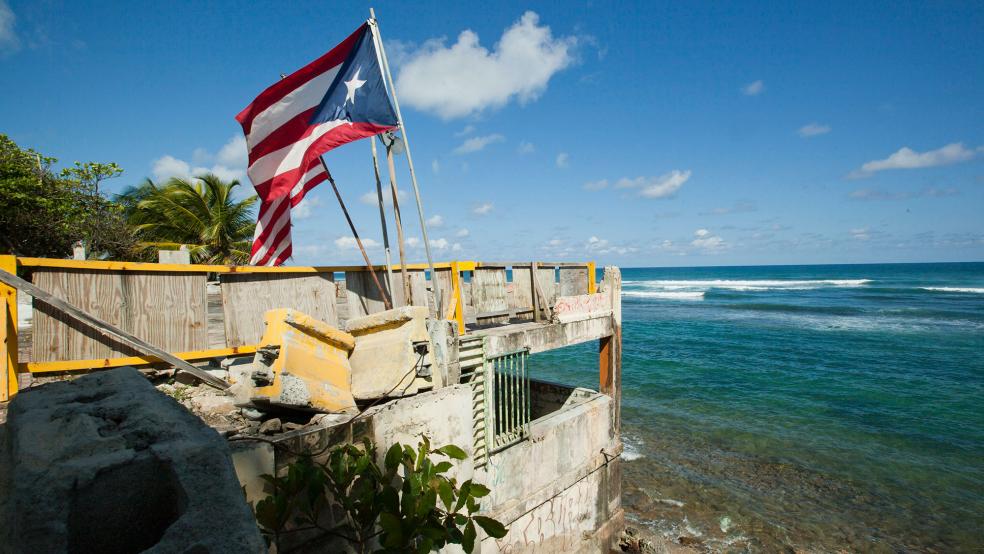Elizabeth Warren had a message for the Obama administration today: Be as creative in finding a solution for the 3.5 million American citizens in Puerto Rico as you were in protecting bank profits after the 2008 crisis.
The issue arose in a Senate Energy and Natural Resources Committee hearing on Thursday morning about the island commonwealth, which owes $73 billion in debt it cannot repay. A large chunk of the debt is owned by so-called “vulture funds” that picked it up at a discount. The creditors want Puerto Rico to find the funds to pay them off by drastically cutting services and selling assets, guaranteeing continued economic recession for the island’s inhabitants.
Related: Puerto Rico Breaks Off Talks with Creditor Group
Late Wednesday, the Obama administration released a “Roadmap for Congressional Action” to deal with the debt crisis. It included allowing Puerto Rico to obtain bankruptcy protection, which is currently barred by U.S. law. But the report adamantly stated that, while administration officials are working closely with the Puerto Rican government, “there is no set of administrative authorities that can fully address and resolve this crisis… only Congress can provide the critical tools Puerto Rico needs to restructure its debt.”
The hearing gave Warren an opportunity to respond. Antonio Weiss, a counselor to Treasury Secretary Jack Lew and one of the administration’s leading point people on the debt crisis, gave testimony at the hearing. Warren and Weiss have a history. He was initially nominated to serve in the No. 3 position at Treasury, but after Warren criticized his lack of regulatory experience and Wall Street ties — Weiss spent 20 years as an investment banker at Lazard — he withdrew his nomination, taking the counselor position instead. This hearing was the first time Warren and Weiss have appeared together in public since his withdrawal.
Warren endorsed the administration’s Congressional roadmap; she has co-sponsored legislation to lift the bankruptcy restrictions. But the senator asked Weiss if he thought Treasury had “absolutely no power to help the people of Puerto Rico without congressional action.” Weiss responded that broader bankruptcy protection “would bring creditors to the table who otherwise would have no intention to enter into negotiations.”
Related: What Will It Take to Solve Puerto Rico’s Debt Crisis?
This appeared to set Warren off. “Let's face it, in Washington, sometimes things like this that sound good amount to just passing the buck,” she told Weiss. She contrasted Treasury’s current appeal to Congress to its actions during and after the financial crisis: “Treasury stretched the limits of its authority to make sure that the banks stayed afloat, it helped broker deals between banks, it applied pressure to get parties to accept deals they may not have liked very much.”
Indeed, the Treasury Department played an extensive role in the sale of Bear Stearns to JPMorgan Chase, the bailout of AIG, and the federal takeover of Fannie Mae and Freddie Mac, including engaging in legally dubious measures.
While legally, Puerto Rican debt cannot be extinguished, Warren appeared to be saying that the U.S. Treasury has leverage over creditors unavailable to the island commonwealth, and should be willing to use it.
Related: Puerto Rico Faces Humanitarian Crisis Without Federal Action
The people of Puerto Rico “understand there is no bailout on the table for them and they are not asking for one — after all, they’re not a giant bank,” Warren said. But she thought Treasury had the ability to “stand up to the vulture funds,” perhaps by brokering deals acceptable to all sides. “I urge Treasury to be just as creative in coming up with solutions for Puerto Rico as it was when the big banks called for help,” she concluded.
Weiss could not respond right away, as the hearing went into recess so senators could vote on the floor. But later on, he addressed Warren’s comments, which he described as “very fair,” by saying that “Treasury and the broader administration will apply all of its efforts and all of our creativity and all our resources to the resolution of this financial crisis, just as we have in past crises, and we will leave no stone unturned.”
Also at the hearing, senator and presidential candidate Bernie Sanders called for Treasury to convene a meeting between Puerto Rican officials and creditors, to prevent “massive human suffering” and work out an acceptable compromise. He sent similar comments to Treasury Secretary Lew on Wednesday.
Republicans in Congress have thus far shown little inclination to act on Puerto Rico even before the administration’s endorsements.






